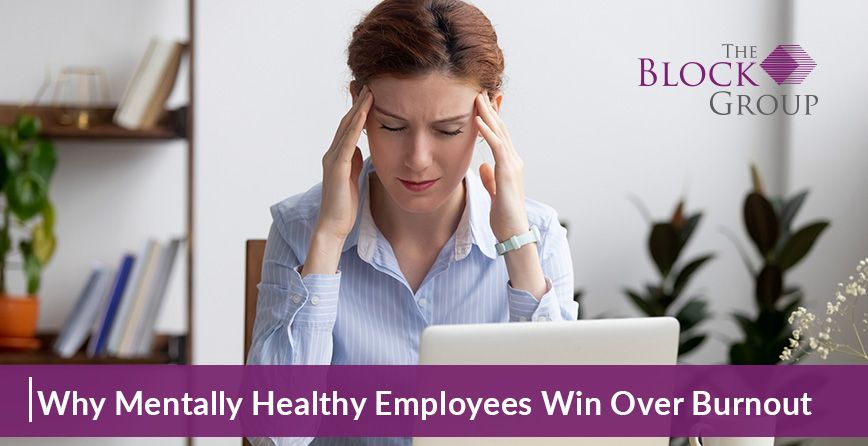
Why Mentally Healthy Employees Win Over Burnout
We’re months into the biggest remote work experiment of our lifetimes, and for many, it’s going well. A future where we work from home at least part of the workweek, even beyond the pandemic, is now favored by 82% of company leaders.
As our homes morph into our office, the reality is that we’re working, on average, an extra 48.5 minutes per day. The divide between our professional and personal lives has drawn so thin that 77% of employees say establishing boundaries between work and personal life is the most important remote work skill. Combining the influences of the global pandemic, a recession, social unrest, increased parenting, and virtual schooling responsibilities, and a polarizing election just months away, you’ve got a sterling recipe for exhausted and burned-out employees.
With Facebook, Uber, and Google extending remote work for at least another year and companies such as Twitter and Zillow favoring indefinite work-from-home arrangements, it’s clear that remote is here to stay. In a few months’ time, longer working hours won’t just be a novel trend, but the new working norm.
For businesses that promote employees as their greatest assets, now is the time to make a commitment to them.
First order of business, make mental health a leading priority, not an afterthought from the HR department. Here’s how to transform your company and put a larger emphasis on mental health.

Mandate Time Off
Productivity is a paradox. We tend to think that if we up the hours, we’ll up the output. However, productivity is often a paradox. When we do a little less, it can mean we are ultimately doing more.
A refreshed, motivated employee can get more work done in just a few hours than a tired, overworked employee can do in an entire day. And during this pandemic, an overworked employee is more the rule than the exception. For employees to do their best work, they need to take time off.
Recently, vacation requests have dropped by almost half compared to the same time last year. If your employees won’t voluntarily take time off, do them a favor and make them take a break. Scheduling a company-wide day (or even a week off) is an easy way to help employees recuperate without feeling guilty. Planning these breaks around holidays is a natural fit. For example, I’m giving my company the Friday off before Labor Day to extend their break to a four-day vacation. This will in turn result in enhanced motivation and productivity down the line. Nearly 70% of workers experience an increase in positive energy and mood after taking a vacation, and 60% feel more productive.

Change The Culture From The Top
Beyond mandated time off, employees should feel comfortable taking personal time off when it best suits them. But all too often, the “always-on” culture that a remote world creates makes workers feel like they need to be chained to their technology at all times, lest they fall behind or upset their boss.
To pull workers out of this idea, upper management must lead change. If managers want their teams to take time off, they’ll need to model the behavior by first taking time off themselves. This sets a healthy precedent for the organization to provide balance for managers and employees alike. It’s also important to remember that when people fail to take time off, they are only hurting themselves, which will lead to costs in healthcare and productivity over time.

Set Mental Health Metrics
During the pandemic, at-home software monitoring employee activity has taken off. But there’s a better use of your time and resources: Tracking mental health. If we don’t know when our teams are struggling, we can’t help them by lightening their load, offering an empathetic ear, or pointing them toward the resources they need.
Employees may be hesitant to proactively share their struggles with their boss. That’s why surveying your team to gauge their emotional/mental state will help to balance their workloads and create a greater sense of unity and connection. Further, tracking time off will help make sure that everyone is getting the rest they deserve. It’s understandable that employees may forgo travel plans and large social gatherings due to pandemic concerns, but just because options are limited doesn’t mean employees should be canceling their time off. Companies such as Intel have launched “staycation challenges” to encourage employees to share creative ways to kick back in their homes and local areas, showing that time off is just as important, and can be just as enjoyable, no matter the destination or activity.

Rethink Workplace Perks
Companies with sought-after perks such as free food and drinks, common spaces, and games are out of the question for remote workers. But just because employees are now working from home doesn’t mean that these perks have to end; they just need to change.
Flexibility can become the best remote-work perk. Think meeting-free work hours, weekly exercise/wellness classes, and the option to choose where you work and when you work. Companies need to shift away from the rigidity of an outdated 9-to-5 workday and empower employees to design their work around their lives, not their lives around their work.
With the right mental health strategy fit for a remote workforce, your business won’t fall to the siege of stress and burn out. Instead, you’ll be well supplied to outlast not just this year’s troubles, but many more battles to come.
Source: Fastcompany
Patty Block, President and Founder of The Block Group, established her company to advocate for women-owned businesses, helping them position their companies for strategic growth. From improving cash flow…. to increasing staff productivity…. to scaling for growth, these periods of transition — and so many more — provide both challenges and opportunities. Managed effectively, change can become a productive force for growth. The Block Group harnesses that potential, turning roadblocks into building blocks for women-owned businesses.




